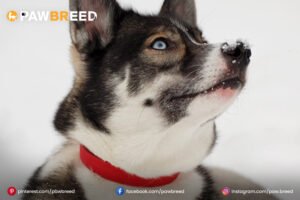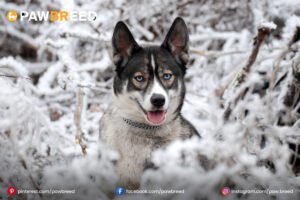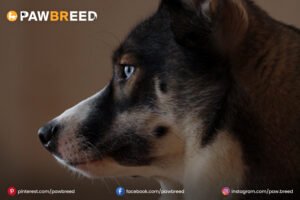The history of the Husky Agouti breed dates back over 1500 years. They are descended from the same family tree as the extinct Taymyr wolves. These dogs were raised at high altitudes of ice and trained in the extreme cold of Siberia.
In the Arctic Circle, Husky Agouti dogs were initially trained as working dogs. In the summer, they transported people and supplies, and in the winter, when there was a lot of snow, they pulled sleds. They had a reputation for being lively and loving dogs.
Overview of Husky Agouti
Although Husky Agouti dogs are primarily known for their attractive appearance and wolf-like demeanor, there is much more to notice if you look past their appearance. Like all other Siberian Huskies, they have an identical past. They received training as working dogs to move cargo across bitterly cold terrain.
Their visage resembles that of a fearsome wolf exactly. Although they give off the image of being quite fierce and frightening, they actually have a very friendly disposition and will begin to press up against you in an attempt to get your attention.
Once you’ve read about their character attributes, you’ll want them in your home. They constantly seek your attention and are lapdogs. They experience separation anxiety, therefore you can’t leave them alone for an extended period of time.
They must reserve a great deal of their extremely high energy levels. You can train and exercise with this energy. They must be occupied in order for them to use this energy and become fatigued; otherwise, they may start chewing on your belongings or scuffing your couch.
Looks and Appearance
Aesthetics
Husky Agouti has brown eyes or may acquire a husky’s blue eyes. They may look like a fawn or a sable like a German Shephard or have tan points or coloration of a wild type.
Size
Generally speaking, they are the same height as Siberian huskies. They typically stand 20 to 25 inches tall. They weight between 30 to 60 pounds.
Coat
They have a husky’s double coat, with dense, silky fur on the inside. They vary in length from short to mid-length outer coats. Their sleek coats require frequent cleaning to prevent matting or tangling.
Color
Their coat is normally of color charcoal grey, grey and white, pale grey, blackish grey, and darker grey. They have wolf-like hues on their coats. The word “agouti” refers to the hues of the black, banded coat. It implies that the one color they have will be a blend of two.
Grooming
They have extremely high grooming requirements. Their coat requires brushing every day. You can give them a bath once a month or whenever they get dirty. They must have their teeth brushed twice a day if not more. Clean their ears once a week and their eye boogers daily.
Shedding
Husky Agouti does shed occasionally. Twice a year, in the spring and fall, when they shed their undercoats, their shedding gets severe. It’s critical that you brush their coat every day throughout these seasons to prevent tangling.
Behavior and Temperament
Outgoing
This breed is incredibly gregarious and gregarious. They’ll quickly develop an attachment link with you and become your friend. Whether or if they are strangers doesn’t matter to them. All they want to do is play and run with you.
Intelligent
They possess the same intelligence and quick reflexes as other husky breeds. They are also quite active and energetic because they were designed to be working dogs. They are outgoing and intelligent. Their high level of intellect makes them easy to train.
No fear of strangers
They are all quite amiable. They long for the love of people, in general. They become more vulnerable with strangers, exposing their bellies and requesting belly massages. They are not the greatest option for watchdogs precisely because of this.
Aggressive
Until you start yelling at them or punishing them, Husky Agouti will not become violent towards anyone. Since they dislike barking, they prefer a calm atmosphere.
Diet and Health
High-quality diet
High-quality dog food is necessary for this breed because they are highly active and energetic. They are working dogs thus they need food that has minerals, essential oils, proteins, and all the supplements. Make sure you avoid giving them human food items like chocolate, coffee, and vegetables like onion and garlic that could upset their stomach.
Health risks
Husky Agouti dogs, like many other dog breeds, are susceptible to a number of health issues, such as:
Vision issues: In contrast to juvenile cataracts, which result in hazy lens opacity and may lead to permanent blindness, glaucoma is caused by damage to the nerve serving the back of the eye. A genetic illness called progressive retinal atrophy causes a dog to gradually go blind over time.
Hip dysplasia: This condition affects a lot of dog breeds, big and tiny. A hip joint functions as a socket and a ball. The ball and socket do not fit or develop correctly when hip dysplasia takes place. Dogs find it difficult to sit or stand as a result.
Arthritis: When you have arthritis, this can range from mild and infrequent to dogs who are really struggling walkers.
Epilepsy: It is a nerve disorder in which a dog starts having seizures and shaking. There is generally no main reason for this order, it is mainly gene-inherited.
Some major diseases you can easily prevent by looking after your dog’s health! You also want to get your dog examined periodically by the vet so you can catch any diseases early and take steps to prevent them.
Exercise and Training
Independent and Stubborn
Husky Agouti dogs are naturally very independent and stubborn dogs, making them difficult to teach. They are quite challenging to train because of this. Their prey-catching impulses are very strong and they are readily diverted by other things. It is difficult to inspire them. They are not easily won over.
They require the assistance of an expert to train them. One way to train them would be to use valuable goodies and an incentive system. To prevent boredom, make sure your training sessions are brief.
High energy
It is well known that Huskies were bred to lug sleds across great distances in Siberia’s extreme cold. They therefore possess a high quantity of energy by nature. It takes two to three hours a day to complete their activities.
Fenced yard
Because they like to run about and play a lot, a fenced yard is essential for them. They may be too much for you to manage because of their extreme energy. They must be leashed if you take them to parks. They love to run, so you may take them on a jog to get in their daily exercise.
Indecent activities
Your dog will be bored and hyperactive if they are not trained or exercised for a day. They will begin focusing their energies on things you dislike, such as chewing on your shoes or scuffing your couch. This is what they’ll do to get your notice.
If they use the day’s energy for training and exercise, they will get fatigued and content during the day.
Watchdogs
Husky Agouti does not make good guard dogs or watchdogs. It’s mostly due to their amiable disposition. Rather than being defensive, they will start requesting belly massages. Despite looking like wolves, they don’t enjoy barking.
In Conclusion
If you have a completely fenced yard, you should get an Agouti Husky because they are highly active and love to roam. They require strenuous exercises like hiking and jogging. They get along well with children and other canines and are naturally extremely friendly.
If you want a dog that is easy to train, these are not for you. They enjoy serene settings and are quite quiet. Never judge someone by their appearance; they make poor watchdogs.
FAQs
1. What is the Agouti Husky’s size?
An adult Agouti may reach a height of 25 inches and a weight of 50 pounds. As much as a Siberian husky, they grow.
2. How rare is the Husky Agouti breed?
They are extremely rare because it is unlikely that they will be discovered quickly. In most cases, you won’t find them in shelters if you want them. You will need to get in touch with sled dog racing breeders.
3. Can you hear Husky Agouti talking?
No, they’re not usually particularly chatty. Typically, they are not particularly noisy or to bark. Rather, they whimper, wail, and whine. They are not for you if you live in a noisy neighborhood because they like tranquil settings.




